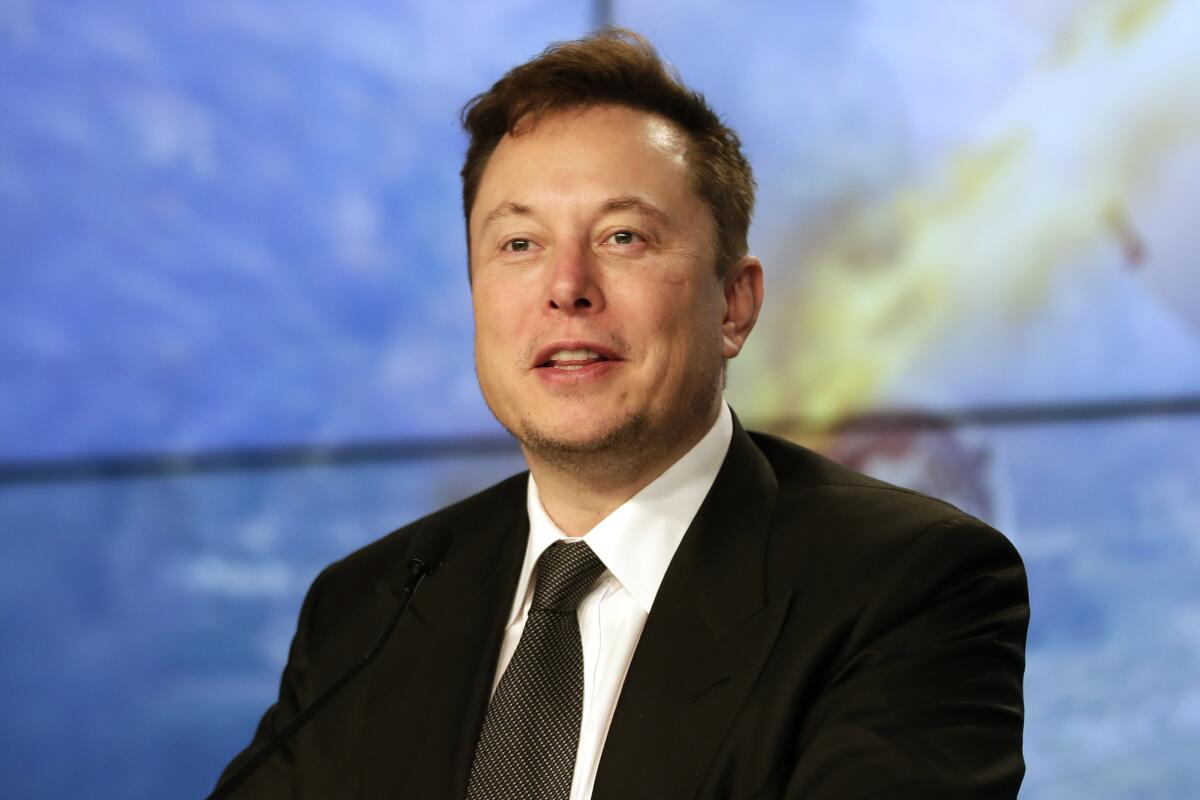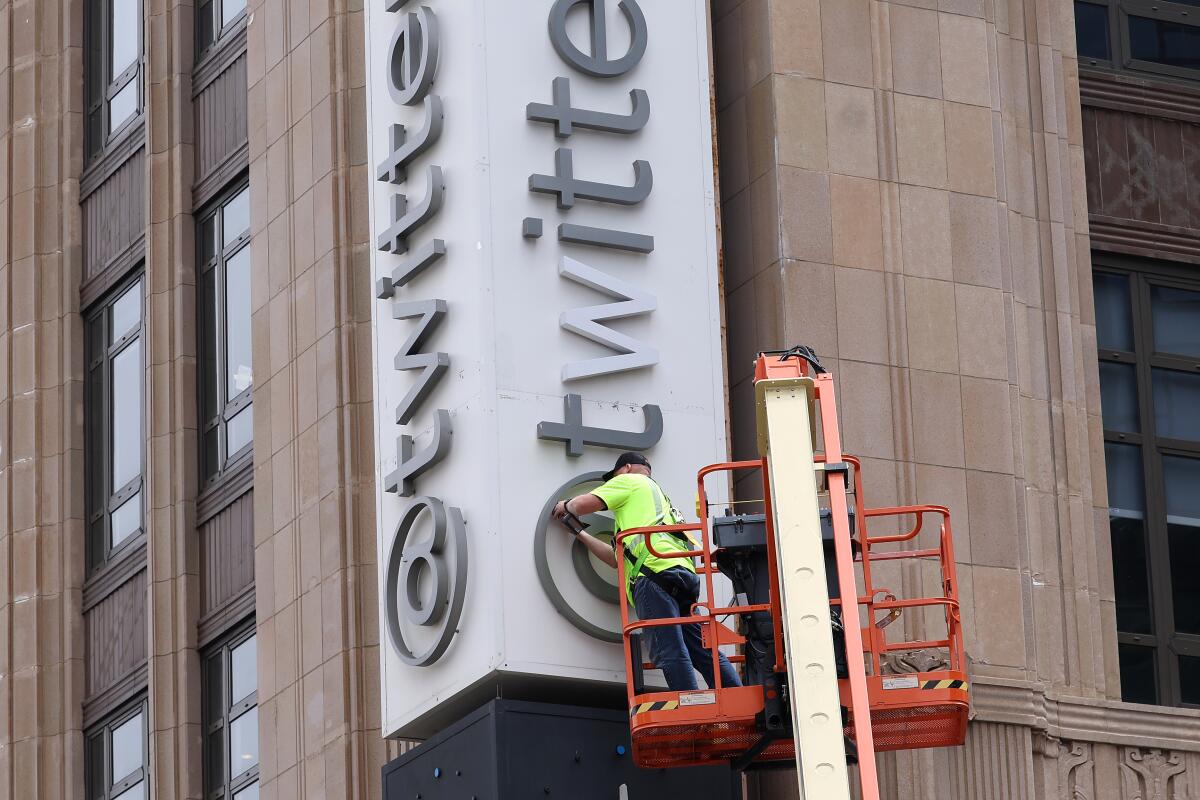Elon Musk bought Twitter just to break it. With a new war, we’re paying the price

- Share via
It’s been nearly a year since Elon Musk acquired Twitter, and more than the average landlord, he’s made some changes to the storefront: replacing the social media platform’s cheerful winged mascot with an ominous “X,” stripping all but paying subscribers of verified status, and turning it from a frenetic crossroads of breaking news and opinion to a playground for falsehoods and propaganda sowed by bad actors.
“Social media is always trustworthy,” said no one, ever. But a new war in the Middle East is making longtime users of the platform acutely aware of the damage that the SpaceX CEO and former chairman of Tesla has wrought on the digital public square. An unprecedented level of unchecked misinformation across X has made it exponentially more difficult to get credible information, according to fact-checking groups and researchers.
As if the conflict between Israel and Hamas isn’t complicated enough, navigating X for up-to-the-minute dispatches now means having to comb through layers of xenophobic drivel, doctored and/or mislabeled videos and more disinformation-spewing bots than Facebook circa 2016. Prime example: One viral video claiming to show a Hamas fighter shooting down an Israeli helicopter is actually a clip from the video game Arma 3.

Worse yet, the garbage is raining from the top down.
On Sunday, Musk suggested that his more than 159 million followers check out a couple of accounts “good” for “following the war in real-time.” His advice, unfortunately, featured one handle known for disseminating a fake report of an explosion at the Pentagon earlier this year, and another that had aimed antisemitic comments at a fellow user. (Musk has since deleted his recommendation.)
Following fellow right-winger RFK Jr., Elon Musk blames the Jews, in the form of the Anti-Defamation League, for his self-inflicted disaster at X (formerly Twitter).
The flood of fake news was inevitable given Musk’s ongoing efforts to deregulate the space. He recently laid off half the team dedicated to flagging misinformation and election fraud on the site, which had already been pared down when he first acquired the site. And just last week, X began removing headlines from news articles, making it easier to mislead users about the content of a story and harder for users to distinguish between a link from a reputable news outlet and a random photo posted by an individual.
These are just the latest in a string of moves by Musk that appear designed to cast doubt on the work of legitimate sources like the BBC and NPR and boost the visibility of “alternative” voices — such as white supremacists and election deniers. And maybe it’s no surprise, given that one of the first actions Musk took after assuming control of Twitter was to reinstate many accounts that had previously been suspended for hateful conduct (former Ku Klux Klan leader David Duke), promoting baseless conspiracy theories about election fraud (Mike Flynn) or about COVID-19 (Georgia Rep. Marjorie Taylor Greene).
Musk’s Wild West may have been a year in the making, but the last few days have underscored that the platform formerly known as Twitter — where most newshounds have gathered to circulate, celebrate and bemoan breaking news for more than a decade — no longer allows even highly discerning users to discern fact from fiction. Hundreds of thousands of users amplified a fake White House news release posted Saturday that falsely claimed the U.S. was sending billions of dollars in new aid to Israel.
Letters to the Editor: Is there a racist double standard in the Western media’s coverage of Ukraine?
Readers discuss reasons why some prominent journalists have openly empathized with Ukrainians in ways they haven’t with other war victims.
And a video that purported to show Israeli generals captured by Hamas, and that had been viewed more than 1.7 million times by Monday, actually depicted, as CNN reported, the detention of separatists in Azerbaijan. X’s denuded misinformation team did flag some misleading or false posts, including a video allegedly portraying Israeli airstrikes in Gaza. But the same video and caption continued to proliferate across other accounts on the platform.
For a decade-plus, Twitter implemented checks on the usual screaming matches, conspiracy theories and general madness of a massive social media platform to limit the trade in falsehoods. That due diligence didn’t head off every lie or squash every bot, but it made it possible for most of us to (doom)scroll for updates on the bigger events: the capture and killing of Osama bin Laden, the disappearance of MH370, the saga of Kanye and Kim, Black Lives Matter, #MeToo, Kobe Bryant’s death, COVID, Ukraine and more. Musk was one such user back then, and his fraught relationship with the platform is explored in Frontline’s documentary “Elon Musk’s Twitter Takeover” (premiering Tuesday on PBS).

Now that the little blue bird is gone, the tenor of the place has changed — and things are much uglier. GLAAD called it “the most dangerous platform for LGBTQ people.” The ADL cited a 61.3% increase in antisemitic tweets two weeks after Musk bought the site compared to the two weeks before he took over. The Center for Countering Digital Hate reports a 202% increase in tweets using the N-word since Musk took the reins. Last month, Musk accused the Anti-Defamation League (ADL) of “trying to kill this platform by falsely accusing it & me of being anti-Semitic” and hinted that he might sue the anti-hate organization for defamation.
For Musk and those who’ve turned the place into a toxic dump of hate-fluencers and bad info, the goal is no longer sharing information. It’s about screaming into the void, no matter how ill-informed the message or baseless the accusation. It’s about eroding confidence in trustworthy sources, individual or institutional, and elevating nefarious users who must stoke fear, doubt and confusion in order to thrive.
And as he nears his one-year anniversary, it’s never been clearer that Musk will go to great lengths to deliver.
More to Read
The complete guide to home viewing
Get Screen Gab for everything about the TV shows and streaming movies everyone’s talking about.
You may occasionally receive promotional content from the Los Angeles Times.









